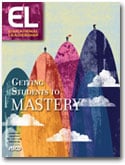Education Leadership: Getting Students to Mastery
CompetencyWorks Blog
ASCD’s Education Leadership’s new issue Getting Students to Mastery includes articles by Grant Wiggins, Kathleen Cushman, Thomas Gus key and Eric Anderman. Topics include what does mastery mean, what is good enough, how to use technology to support mastery, and instructional practices.
key and Eric Anderman. Topics include what does mastery mean, what is good enough, how to use technology to support mastery, and instructional practices.
The essays are useful ways to generate conversation and find out how states, districts and schools are managing them. For example, in his essay “How Good Is Good Enough?” Wiggins raises an important point, advising educators to keep the big picture in mind rather than falling prey to guiding students through a linear sequence of tiny bite-sized standards:
Perhaps as a result of the lack of an overall vision for what constitutes mastery, education has a long-standing practice of turning worthy learning goals into lists of bits. One might even say that this practice is the original sin in curriculum design: Take a complex whole, divide it into small pieces, string those together in a rigid sequence of instruction and testing, and call completion of this sequence “mastery.” Although well-intentioned, this practice leads to needlessly fractured, boring, and ultimately in effective learning that never prepares students to be fluent and skilled in authentic work.
New Hampshire guards against this with its College and Career Readiness Competencies setting about a dozen large competencies for English Language Arts and another for mathematics to help teachers stay focused on that big picture of what we want kids to be able to know and do. In Maine, they are developing the capacity to assess the statewide “guiding principles”. Both states know that performance tasks and assessments are needed to make sure that we are keeping our eye on the big picture of what we expect for our kids.
The articles are all useful for thinking about classroom practice. However, remember when you are reading the articles that competency education is a whole-school practice, not something that teachers can implement on their own. We’ve learned from that experience, recognizing the importance of school-wide grading policies to enable standards-based grading (as compared to standards-referenced where students are passed on with Cs and Ds), schoolwide support systems (rather than acting as if teachers can possibly meet the needs of every student in their classroom alone) , and creating opportunities for students to advance or go deeper as they reach mastery (rather than thinking about the limits of learning within the classroom).